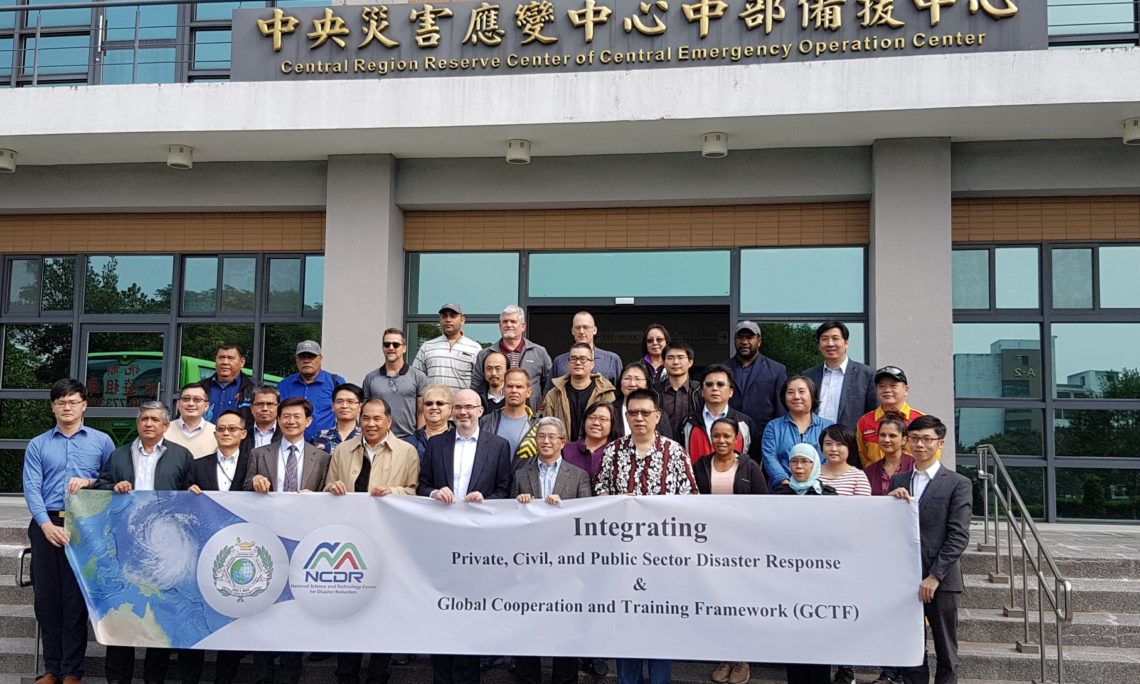December 14, 2018
AIT Official Text #: OT-1845
Remarks by Deputy Director Raymond Greene
Opening of the GCTF Workshop on Humanitarian Assistance and Disaster Relief
December 14, 2018
(As Prepared for Delivery)
Good morning, Deputy Foreign Minister Hsu, Director Lee, Director Gumataotao and colleagues from Asia-Pacific Center for Security Studies (APCSS), and our friends from around the region. Welcome to Nantou!
First, let me extend our appreciation to Dr. Li Wei-sen and his team at the National Center for Disaster Reduction for helping to put together this event. Thank you also to Director Lee and the National Fire Agency for hosting us today at this world-class training facility.
Thank you to my friends at APCSS for supporting this worthy sequel to your Humanitarian Assistance and Disaster Relief (HA/DR) workshop, and of course I must thank the Ministry of Foreign Affairs, particularly Deputy Foreign Minister Hsu, for your unwavering support for the U.S.-Taiwan Global Cooperation and Training Framework.
Most importantly, to all our expert guests from around the region, thank you for staying an extra day in Taiwan and being part of this important effort.
One of our top priorities at the American Institute in Taiwan is promoting Taiwan’s participation in the international community. As we face a multitude of global challenges, we cannot afford to exclude a partner with so much to offer the world. Taiwan’s leadership and contributions can play an important role in advancing a free, open, and secure Indo-Pacific.
Through the Global Cooperation and Training Framework, or GCTF, the United States and Taiwan have brought together hundreds of officials and experts from across the Indo-Pacific to share best practices in many different areas, from public health to women’s entrepreneurship to media literacy.
Today’s workshop is the second one we’ve held under the GCTF focused on humanitarian assistance and disaster relief, highlighting our belief that Taiwan is a regional leader in disaster prevention and response.
Since the destruction wrought by the 9/21 earthquake in 1999, Taiwan has worked hard to develop its ability to respond to the various kinds of natural disasters that can occur here, and in doing so has become a model of disaster preparedness for the region. Moreover, Taiwan continues to demonstrate its desire to help others in need, as seen by its quick response to Typhoon Haiyan in the Philippines in 2013 and the flooding and landslides earlier this year in Japan. Given this tremendous capacity, it makes perfect sense for the United States and Taiwan to partner with each of you and your countries to bolster our ability to respond to disasters whenever and wherever they occur.
As you are all well aware, disasters can happen at any time and any place. Asia, in particular, is susceptible to a wide range of natural disasters, from earthquakes to typhoons. Some participants were not able to attend this week’s workshop because they had to respond to emergencies at home.
Generating a robust domestic and international response to natural disasters is essential to ensuring that each of our communities, and the region as a whole, can rebound quickly. We hope the APCSS co-hosted workshop helped you form connections with each other over the past two days so that, when a disaster does occur in the future, you can quickly reach out to others for assistance.
Lastly, we hope that today’s event can showcase the remarkable capabilities that Taiwan can bring to bear, particularly this training facility, one of the largest in the region. I would encourage you all to consider how your countries can work more closely with Taiwan in this area.
Again, on behalf of the American Institute in Taiwan, I want to thank our visitors, and offer my encouragement for the work that you do to keep your countries safe and resilient. I am so delighted that you were all able to take time to participate in this important workshop. Thank you.
















![Video Thumbnail [Recovered]-01](../wp-content/uploads/sites/269/Video-Thumbnail-Recovered-01-1-750x450.jpg)





